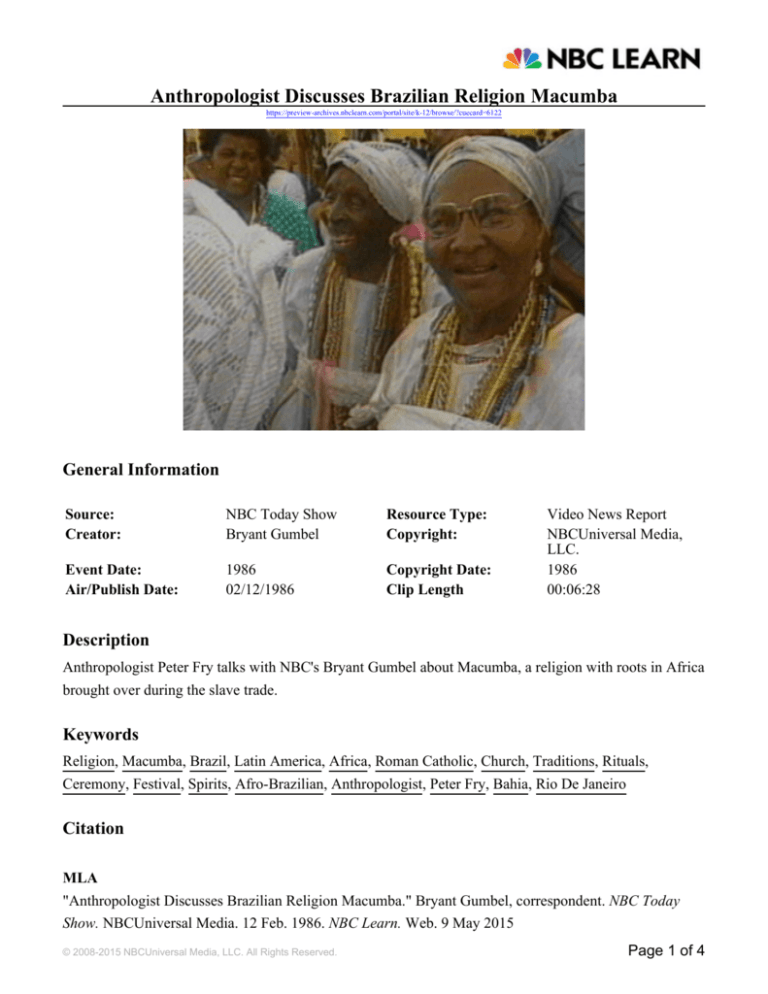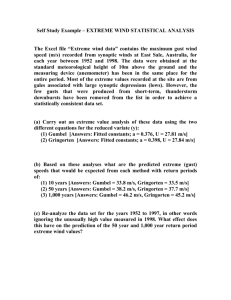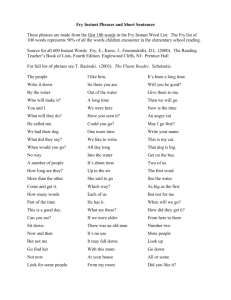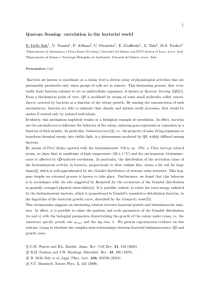
Anthropologist Discusses Brazilian Religion Macumba
https://preview-archives.nbclearn.com/portal/site/k-12/browse/?cuecard=6122
General Information
Source:
Creator:
NBC Today Show
Bryant Gumbel
Resource Type:
Copyright:
Event Date:
Air/Publish Date:
1986
02/12/1986
Copyright Date:
Clip Length
Video News Report
NBCUniversal Media,
LLC.
1986
00:06:28
Description
Anthropologist Peter Fry talks with NBC's Bryant Gumbel about Macumba, a religion with roots in Africa
brought over during the slave trade.
Keywords
Religion, Macumba, Brazil, Latin America, Africa, Roman Catholic, Church, Traditions, Rituals,
Ceremony, Festival, Spirits, Afro-Brazilian, Anthropologist, Peter Fry, Bahia, Rio De Janeiro
Citation
MLA
"Anthropologist Discusses Brazilian Religion Macumba." Bryant Gumbel, correspondent. NBC Today
Show. NBCUniversal Media. 12 Feb. 1986. NBC Learn. Web. 9 May 2015
© 2008-2015 NBCUniversal Media, LLC. All Rights Reserved.
Page 1 of 4
APA
Gumbel, B. (Reporter). 1986, February 12. Anthropologist Discusses Brazilian Religion Macumba.
[Television series episode]. NBC Today Show. Retrieved from https://previewarchives.nbclearn.com/portal/site/k-12/browse/?cuecard=6122
CHICAGO MANUAL OF STYLE
"Anthropologist Discusses Brazilian Religion Macumba" NBC Today Show, New York, NY: NBC
Universal, 02/12/1986. Accessed Sat May 9 2015 from NBC Learn: https://previewarchives.nbclearn.com/portal/site/k-12/browse/?cuecard=6122
Transcript
Anthropologist Discusses Brazilian Religion Macumba
BRYANT GUMBEL, anchor:
You know you walk around Rio or any other Brazilian town and you will stumble on lighted candles
carefully placed at intersections or terra cotta bowls full of food. These are all public offerings to the gods
of Macumba. Macumba: this morning, the subject of our AFTER EIGHT.
Brazil is officially a Catholic country, and at first glance it appears very Catholic. Its most famous Church,
the Sao Francisco Convent in Bahia, is a beautiful gilded testament to the religion the Portuguese brought
here hundreds of years ago. But the Portuguese also brought African slaves, and with them came their
African idol. Maria Jose was baptized a Catholic, but the real church for her is the Church of the African
Spirits. She believes her fortune lies with the goddess of the sea, Yemanja, one room in her small house is
devoted to the patron saint, and the other gods of Candomblé, the most traditional Afro-Brazilian sect
native to the state of Bahia.
These songs and practices were illegal for years, so slaves had to disguise their native gods as Christian
saints. The end result was a mixture of both. Today, Maria Jose is dressed in typical Bahian style, to honor
the festival of Yemanja. Believers bring flowers and perfumes to please this vain mermaid-like goddess.
Even a businessman from Sao Paulo offers roses.
Unidentified Man: When they put together all the Christians, plus all the African, it brings you some type
of power. I believe in the powers.
GUMBEL: It is the belief in these powers that brings over 30 million adherents to Macumba and its
increasing all the time. Yemanja’s festival and the baskets full of offerings are taken to Yemanja’s ocean
home. If she accepts the gifts, and not one rose floats back to shore, then the years to come would be
prosperous and happy. Yemanja so far always accepts.
Peter Frey is joining us dockside at the Rio Yacht Club. He’s an anthropologist in Rio de Janeiro and has
studied Afro-Brazilian religion for 15 years now. Good morning thank you for being with us.
Mr. PETER FRY, Anthropologist: Good morning Brian.
GUMBEL: Just how tight a hold would you say Macumba has over Brazil?
© 2008-2015 NBCUniversal Media, LLC. All Rights Reserved.
Page 2 of 4
FRY: A much tighter hold than you’d ever think looking at Brazil, because it’s a religion that people
assume to be carried out by black people mainly, well it is, the practitioners are black, but everybody…
GUMBEL: Why did it find such fertile ground here? We can assume the slaves brought the same kinds of
beliefs over to the United States and it didn’t find the same kind of fertility.
FRY: The big difference between Brazilian-Portuguese colonization and Anglo-Saxon colonization in the
United States of America. I think in the United States the idea was to segregate and squash, and in Brazil I
think people couldn’t beat them so they joined them so it’s a different kind of system.
GUMBEL: We’re talking about the hole that is has. Does Macumba necessarily find it more receptive
among a certain class of people?
FRY: Well, people--like I said the main priests and priestesses are poor and black, predominantly. But
everybody believes in Macumba, politicians believe in Macumba.
GUMBEL: You say everybody, I mean, everybody?
FRY: Well I say everybody because I don’t know, but, I mean, most people do. And if you push them
you’ll find that they’ve been once or twice in their lives, they’ve had something to do with it, and if they
haven’t their brothers have or their cousins have.
GUMBEL: Doesn’t that create a problem for Brazilians who are Catholic? I mean can they be Catholic
and, what is someone, is someone Macumban?
FRY: No, everybody’s Catholic. If you look at the census returns you’ll find a very small number of
people who declare themselves Macumban (unintelligible), or Afro-Brazilian religion, people. So
everybody declares themselves to be Catholic, there’s no contradiction between one thing and the other.
So you can even find a priest, who said to me the other day in Bier, that he was first of all a Catholic
because he was baptized a Catholic but then afterwards he became a …
GUMBEL: Does the church have an official position on it here?
FRY: It used to, it used to be very much against this religion. The church, the police, the dominant people
in general. But recently the church has begun to be more tolerant in relation to….
GUMBEL: The government has too?
FRY: The government has too.
GUMBEL: Does the government have an official position?
FRY: It doesn’t have an official position, politicians do. Politicians tend to look through; they tend to go
around there to get votes.
GUMBEL: They’re the same everywhere. Let’s show a piece of tape, because one day we had a woman,
I’m looking down to get her name right, we had a woman in, Sonya Diashulapara, from (unintelligible).
Now she came to clean out our office in Rio of evil spirits. Now what is she doing?
FRY: Well she’s a, she’s holding, she’s using guinea, which is a plant that originated from Africa and
she’s sweeping away the evil spirits, which is a good example of how you got yourselves wrapped up in
the same system. I’m not quite sure who asked her to do this for you.
GUMBEL: Maybe Mike Preston, that’s our unit producer right now who might have invited her in. I
mean is this laughable that we did this or is it respected that we did this?
FRY: No, on the contrary. The fact that you did this shows some respect anyway for the country in which
© 2008-2015 NBCUniversal Media, LLC. All Rights Reserved.
Page 3 of 4
you’re working. And like everybody else who comes to Brazil, sooner or later they get wrapped up in it.
And it seems that she wasn’t very successful, I saw that there was a…
GUMBEL: We had a little bit of a malfunction yesterday, yeah. Does that mean she cast an evil spell on
us?
FRY: No I don’t think so. I think people might like to find some kind of scapegoat for what happened and
there she was.
GUMBEL: Does Macumba have a moral code, I mean a code of ethics, a system of beliefs like
Catholicism, like Episcopalians, like Judaism?
FRY: It has a different code of beliefs, a different code of ethics. You’re supposed to carry out your
obligations to your saint, and you’re supposed to enter into a system of give and take with your friends
and relatives. But it doesn’t tell you what you should do, it doesn’t tell you with whom you should sleep
or whether you should get divorced or whether you should do this, that and the other. It’s a religion that
doesn’t…
GUMBEL: So there’s really a spirit of almost harmony with nature, of getting yourself in tune with your
environs.
FRY: It’s a very, very tolerant religion indeed.
GUMBEL: What religion do you declare?
FRY: I don’t declare any religion at all. I was 13 when I decided that. I may change my mind.
GUMBEL: Do you believe in Macumba?
FRY: I respect Macumba and I do believe it in the sense that you do. I mean I do have my little, my uh
necklace, which I always carry around with me. It’s not here, it’s over there.
GUMBEL: Are some people afraid to say they don’t?
FRY: A number of people are afraid, they’re ashamed. They’re more ashamed than afraid, because there’s
still some kind of stigma attached to Macumba, less than there was but there’s still some.
GUMBEL: Peter Fry, thank you very much. I appreciate it.
© 2008-2015 NBCUniversal Media, LLC. All Rights Reserved.
Page 4 of 4








